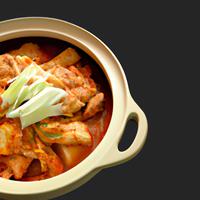
1 serving (250 grams) contains 200 calories, 15.0 grams of protein, 12.0 grams of fat, and 10.0 grams of carbohydrates.

Log this food in SnapCalorie

Nutrition Information
Calories |
188.7 | ||
|---|---|---|---|
% Daily Value* |
|||
| Total Fat | 11.3 g | 14% | |
| Saturated Fat | 3.8 g | 19% | |
| Polyunsaturated Fat | 0 g | ||
| Cholesterol | 37.7 mg | 12% | |
| Sodium | 754.7 mg | 32% | |
| Total Carbohydrates | 9.4 g | 3% | |
| Dietary Fiber | 1.9 g | 6% | |
| Sugars | 2.8 g | ||
| protein | 14.2 g | 28% | |
| Vitamin D | 0 mcg | 0% | |
| Calcium | 47.2 mg | 3% | |
| Iron | 1.4 mg | 7% | |
| Potassium | 283.0 mg | 6% | |
* Percent Daily Values are based on a 2,000 calorie diet. Your daily values may be higher or lower depending on your calorie needs.
Food Attributes
Source of Calories
About Pork kimchi stew
Pork Kimchi Stew, or kimchi jjigae, is a flavorful and hearty dish from Korean cuisine, celebrated for its balance of spice, tang, and umami. The stew's base is made with fermented kimchi, which is rich in probiotics that support gut health and digestion. The addition of pork adds protein and richness, while tofu, scallions, and vegetables like onions complement the dish with nutrients and texture. Typically seasoned with gochugaru (Korean chili flakes) and other spices, it delivers a bold flavor and a warming kick. Though nutrient-dense, pork kimchi stew can be high in sodium due to the kimchi and seasoning, so portion control is key for those watching their salt intake. It's a comforting and robust choice, offering a mix of beneficial probiotics and hearty ingredients that are best enjoyed as part of a balanced meal plan.



